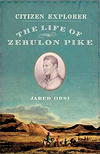
Citizen Explorer: The Life of Zebulon Pike, by Jared Orsi, Oxford University Press, New York, 2014, $29.95
Even though Pikes Peak, that prominent National Historic Landmark in Colorado, bears his name, and even though at the end of his life he was, according to biographer Jared Orsi, more highly regarded than Meriwether Lewis, explorer Zebulon Pike often passes under the radar today. Of course, the in-debt Lewis likely took his own life in 1909, while Zebulon died a heroic military death at the Battle of York (Toronto) on April 27, 1813. But Pike fell short of the fame of William Clark, the better half of the Lewis and Clark duo, at least with regard to post-expedition accomplishments and stability and living with success. As a team, however, Lewis and Clark will perhaps forevermore overshadow officer Pike. Being No. 2 among continental explorers (or No. 3 depending how you look at it), though, is a solid place to be in the history books. The author solidifies Pike’s status.
The New-Jersey born citizen explorer traveled to the headwaters of the Mississippi River in 1805 and soon after went on a greater adventure, crossing the Great Plains to the Rockies and exploring what became Colorado before the Spanish arrested him for “trespassing,” questioned him, seized many of his documents and escorted him back to American soil. Known as the Pike Expedition (1806–07), that military-directed venture came on the heels of the Lewis and Clark Expedition, but Pike published a popular account of his exploits in 1810, four years before the official publication of the journals of you know who. Thus Pike found early celebrity, and it was enhanced by his death in battle. By the Civil War the nation’s memory of the peripatetic Pike had faded considerably.
“Pike’s story provided the raw material for hagiography, because his life reflected America’s central promise,” writes Orsi, an associate professor of history at Colorado State University. “That promise was independence.” Others who have peeked at Pike in the past have called his wanderings in the West ambiguously motivated and have even labeled him a buffoon or a traitor due to his connections with General James Wilkinson and Aaron Burr, both accused of suspected treasonous activities. But Orsi argues convincingly that Pike was “an ardent nationalist, who consciously cast his lot with his nation.” Orsi gives plenty of substantial reasons why Americans should appreciate his protagonist, but his approach at times is a bit baffling, as when he explains some of Pike’s actions and other happenings through “energetics.” For instance, when Pike bought horses from Pawnee Indians, “he needed a new energy source to replace the buoyant waters.” And Pike went among the Osages and Pawnees “to ensure that the nation’s energy system would subsume the natives.” Nevertheless, this new biography of an important American is full of good energy.
—Editor




